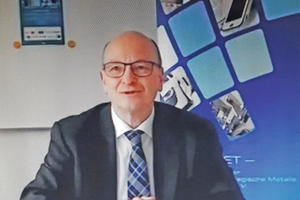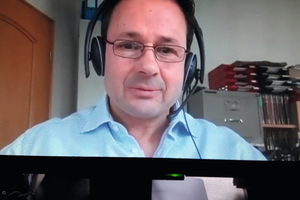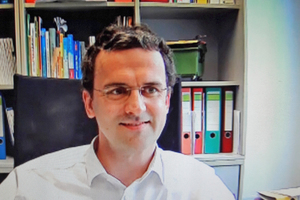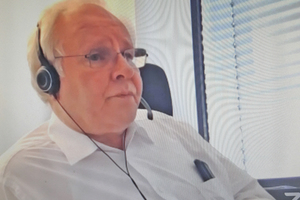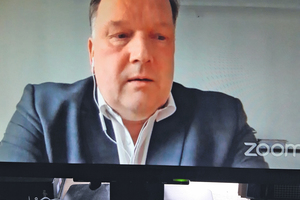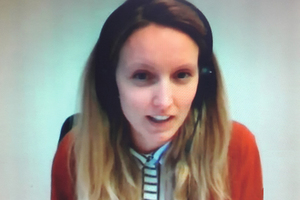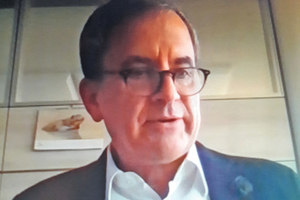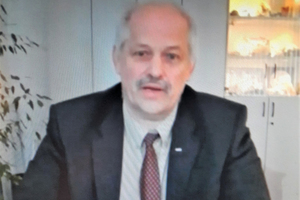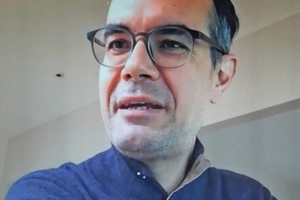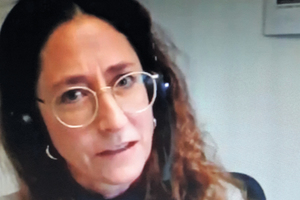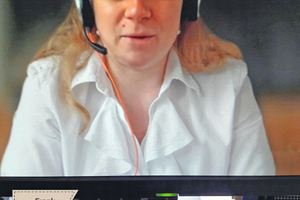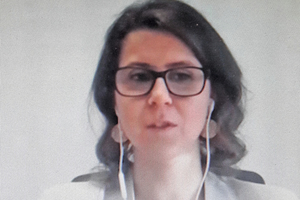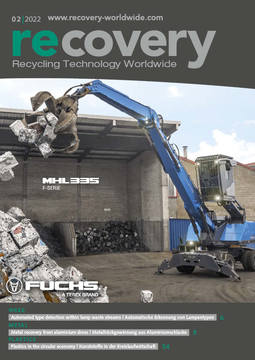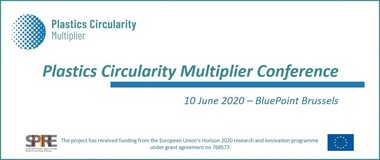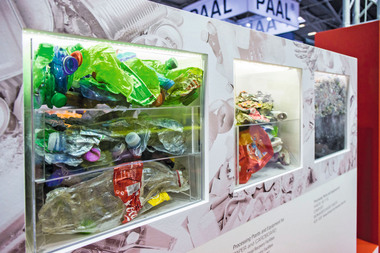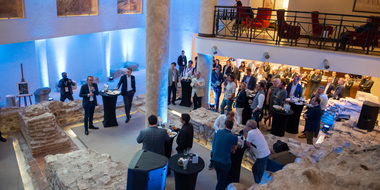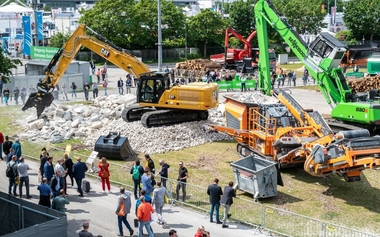Berlin Recycling and Secondary Raw Materials Conference 2021
While last year‘s Berlin Recycling and Secondary Raw Materials Conference could just be held as a real conference before the lockdown caused by the Corona pandemic, in 2021, like so many other events, it joined the ranks of video conferences. This meant a considerable effort for the organizer, Thomé-Kozmiensky Verlag GmbH Neuruppin. Thanks to the wealth of experience gained in the meantime, both the structure of the event and its technical implementation were excellently adapted to the situation. For this, we would like to thank Dr.-Ing. Olaf Holm, the main organizer.
Taking the pandemic into account, the scientific management (Prof. Dr.-Ing. Daniel Goldmann, CUTEC Research Center Clausthal and Prof. Dr.-Ing. Dr. h. c. Bernd Friedrich, RWTH Aachen) had agreed on a much slimmed-down format. The usual plenary session and the subject-specific lecture series were omitted. Instead, the two conference days on March 15 and 16, 2021, dealt with two relevant sets of topics that are of high importance with regard to environmental issues:
Plastics recycling
Battery recycling
Developments in politics and society, the raw material situation and the economic framework conditions influence sustainability and the recycling industry. This is currently evident, for example, in the levying of the EU-wide plastics tax or the introduction of the term „recycled content“ to specify recycling, but also in efforts to promote the recycling of LI ion batteries (LIB) required for e-mobility through government research funding. The status quo and what goals and hurdles still lie ahead or need to be overcome were revealed by the presentations and discussions during the two days of the conference.
Plastics Recycling (Moderation –
Prof. Dr.-Ing. Daniel Goldmann)
In his brief introduction, Prof. Goldmann once again emphasized the high priority of plastics recycling and described this topic as a „perennial issue“. Prof. Goldmann pointed out the latest developments in the legal framework in the plastics sector, all of which unquestionably represent a major challenge for the recycling industry, e.g. the aforementioned plastics tax (80 cents/kg of non-recycled plastic will have to be paid to the EU from 01/2021, certain disposable products will be banned in the EU from 07/2021, lightweight plastic carrier bags will be banned from 01/2022, and there will be a labeling obligation for printing inks, which will make closed loop recycling more difficult. Discussions will also continue on the recognition of the possible recycling paths - mechanical, chemical, feedstock.
In total, there were 10 presentations focusing on the following topics:
Structural issues of plastics recycling and loop management, and
Current developments in the field of recycling and closed-loop recycling.
In addition, their obstacles and limitations were also addressed in the manifold contributions. These should serve to discuss the topic not somewhat dogmatically, as has so often been the case lately, but on the basis of facts.
Appropriate as an introductory topic was the presentation by Prof. Dr.- Ing. Hans-Josef Endres, Leibnitz University Hannover: „Definitions, standards and processes for plastics recycling“. A look at history shows that 8 billion tons of plastics have been produced since their discovery about 100 years ago, but far too little of this fantastic material has been recycled. Moreover, the trend is more and more towards the production of short-lived products from the waste in question, instead of practicing true circular economy. In detail, the speaker went into the quality of recyclates and the need to set standards for market introduction, the type of recycling processes – enzymatic, biological, mechanical (material), chemical (feedstock), defining a recyclate as a plastic from the recycling of plastics. The term recyclate should be concretized and, in addition to the type of waste, also the recycling process and include the content of recycled material. The difficulties associated with the revision and improvement of standardization, such as the lack of the C-14 method as in the case of natural products, were pointed out and the ecological advantage was contrasted with the high costs, which must definitely be taken into account when introducing the product to the market.
The costs of recycling management were also addressed by Dipl.-Ing. Roman Maletz, TU Dresden, in his paper „Economic consideration of measures to increase the use of recycled plastics“ and he presented the methodology chosen for this purpose. The costs and increase effects were determined for 16 measures, e.g. substitution quotas, green public procurement, eco-effectiveness, plant optimization, minimum quantities of recyclate. The total costs for all the measures considered amount to € 800 million, and the achievable rates of increase are 7 %! The conclusion: we will never be able to achieve an affordable perfect recycling economy. Recovery and recycling must not be an end in themselves, but must be understood as a service for the producing industry.
In his contribution, project manager Ulrich Schlotter, BKV GmbH, Frankfurt, looked at the status of plastic waste recycling in Germany (reference year 2019). He gave a comprehensive overview of the current use of plastic recyclates in the various sectors (construction 47 %, packaging 25 %, agriculture 11 %), analyzed the various waste streams according to their share of plastic-relevant waste (household/housekeeping: 3.15 million t and commercial: 2.2 million t) and presented the development of plastic recycling in the areas of energy, mechanical and feedstock recycling since 1994. Although mechanical recycling increased by 130 % to its highest level of 3.1 million t in 2019, this is not enough to meet future German and European legal requirements. The limits of material recycling were also highlighted.
Other contributions also outlined the considerable difficulties in recycling such a heterogeneous group of materials, but these should in no way discourage the search for new ways and opportunities, but should also warn against unexpectedly high expectations and demands. The contribution by Prof. Dr. rer. nat. Rainer Dahlmann, RWTH Aachen „Bringing plastics into cycles – obstacles and limits“ should be mentioned here. He first outlined the need for action as. e.g. due to the enormous decrease in export volumes of plastic waste to China and the fact that so far only about 40 % is recycled in Germany. The following obstacles to mechanical recycling, such as the need for highly efficient waste management, the low material flows, the insufficient recycling capacities, uncertain developments in the legal situation, fluctuating qualities and quantities, high costs and low oil prices, etc., must be overcome. The speaker presented numerous activities of the Institute of Plastics Processing at RWTH Aachen University such as chemical recycling for the recovery of polystyrene waste, development of barrier layers for returnable PE bottles, digitalization of plastics recycling, creation of a standard: R-Cycle = the digital standard for circularity. R-Cycle enables enormously improved sorting and reduces downcycling. Prof. Dahlmann calls for a doubling of recycling rates by 2025, an individual look at products and value chains to close loops, interdisciplinary collaborations and digital transformation to pave the way for plastic cycles.
Dr. Klaus Wittstock, BASF Ludwigshafen, reported on „Chemical and mechanical recycling interacting to create a circular economy.“ He began by noting that only one-third of all plastic waste is kept in the loop. This is far from the goals of the EU Green Deal and the Circular Economy Action Plan. There is a recycling gap of about 20 million tons and this „can only be closed by chemical recycling,“ with mechanical and chemical recycling complementing each other as shown by BASF‘s solutions for mechanical and chemical recycling.
The contribution by Ms. Carina Broneder, Ramboll Deutschland GmbH Munich, which dealt with contaminated plastics in end-of-life vehicles, also focused not only on the possibilities but also on the limits of recycling. The deca-bromodiphenyl ethers (DecaBDE) used as flame retardants in the plastics must be ejected for a sustainable recycling economy. This, however, is associated with considerable difficulties and expenses, which were presented in detail. From this, recommendations for the disposal of decaBDEs were derived, aimed at better separation before and after shredding. From the point of view of decaBDE levels in end-of-life vehicles, restrictions should be imposed on exports to countries without adequate disposal and recovery facilities.
In the topic area „Current developments in the field of recycling and closed-loop recycling,“ application technology processes and results were presented. For example, Heiner Guschall, SICON Verwaltungs GmbH, Hilchenbach, reported on „Flexible and market-compliant plastics recycling in the VW SICON process“ (separation of plastics from shredder residues of end-of-life vehicle recycling and refinement into marketable products).
Two contributions were dedicated to the topic of plastic packaging: Ms. Katharina Schweitzer, CEID Circular Economy Initiative Germany showed the potentials, conditions and challenges that have led to a large number of CEID recommendations and Timothy Glaz, Werner & Merz GmbH, Mainz presented the company‘s concept under the topic „Branded packaging made from post-consumer recyclate“. The company is committed to holistic sustainability and has developed a stand-up pouch made of mono-material with a detachable outer shell for cleaning agents - and in future also cosmetics. This enables 85% upcycling The concept is called reduce packaging + reuse + recycle - so an effective cycle is possible. Textile recycling is not much in the public discussion, although textiles represent the third largest industrial sector worldwide and the second largest consumer goods market in Germany, but only 1 % of this material group is recycled at all today, as Prof. Dr.-Ing. Stefan Schlichter, Institut für Textiltechnik Augsburg gGmbH explained in his presentation. For this material, too, the aim is to achieve closed-loop recycling, for which a number of possible solutions were outlined.
After the final discussion, Prof. Goldmann summarized:
Different materials require different recycling processes,
Science-based statements encourage that it is possible to
exclude landfills and
minimize, even to exclude exports
A future task will be to address plastic waste in the world‘s oceans.
The presentations showed that there will be no universal approach to the circular economy, even – as Dr. Anja Pieper, Volkswagen AG put it „unfortunately politics keeps trying to find a fit-on-all approach“.
Battery recycling (Moderation: Prof. Dr.-Ing. Dr. h. c. Bernd Friedrich)
As in the last conference, the topic of battery recycling is highly topical and still raises enough questions and problems that need to be solved in order to achieve a sustainable circular economy in this field as well. The worldwide boom for electric vehicles that has just started will continue and a significant increase in battery returns can be expected from about 2030 onwards. So, on the one hand, the mass of Li-ion traction batteries for electric mobility is increasing enormously, but on the other hand, the complexity of the challenges for their recycling is also increasing as the presentations on the second day of this year‘s conference clearly showed. The 11 presentations in this section highlighted the legal framework for handling and recycling batteries, shared operational and organizational experiences from the field, and presented the latest process engineering developments. It is no longer only recycling rates that are of interest, but also the recycled content, IT-based battery information and traceability.
Prof. Dr.-Ing. Dr. h. c. Bernd Friedrich, RWTH Aachen, structured the extensive field of Li-ion battery recycling and the many process alternatives necessary for successful technical implementation of recycling in his introductory lecture „Alternative process flows for LIB recycling“, but he also described the challenges involved. Research to date shows: the path from waste to product is very expensive, high added value is only achieved through intelligent enrichment and separation, and different process paths lead to different products. Not every process / every process step is required for perfect recycling, rather it is necessary to optimize combinations and interfaces and to always pursue the best possible value creation in terms of the circular economy as a goal.
These general remarks were underpinned by the technical presentations, which ranged from the political framework conditions to scientific considerations and the presentation of technical results. For example, Mattia Pellegrini and Jose Rizo, EU Commission Brussels, reported on the Circular Economy Action Plan drawn up in March 2020 as part of the EU Green Deal. This also includes extensive measures to increase the recycling and reuse of batteries, which were explained in more detail and their purpose underpinned by figures (developments up to 2035). Also these speakers presented thereby the problem of the ever more numerous becoming contents materials and conformal to it the increasingly more difficult becoming recycling.
Proposed solutions for politics and industry with regard to a circular battery economy were developed by the „Traction Batteries“ working group of the Circular Economy Initiative Germany (over 50 members) based at the German Academy of Science and Engineering, whose leader Dr. Susanne Kladner, acatech Munich, explained them and presented the target image of a circular economy for traction batteries by 2030. From this, 23 recommendations for action were derived, which were introduced into the revision of the EU Battery Regulation.
The considerations of Prof. Dr.-Ing. Alexander Sauer, Fraunhofer Institute for Manufacturing Engineering and Automation Stuttgart, which he presented in his paper „Industrial dismantling of battery modules to secure economically strategic raw materials for e-mobility“ went far beyond this point in time. As part of the joint research project „DeMoBat“, it was possible to show that (partially) automated dismantling is the key to reducing costs in the reuse and recycling of batteries and e-drives. Although the project runs until 2022, major conclusions can already be drawn, for example that growing battery return volumes increase the economic attractiveness of automated battery recycling and the ecological recycling demand, especially of rare electrode materials. A high diversity of variants requires a flexible dismantling strategy. In the future, all dismantling steps must be combined into one overall line, from opening the battery to processing the recovered recyclate.
The presentation by Julia Frank, Northvolt Zwei GmbH & Co. KG, Braunschweig, who first introduced the company, a joint venture between Northvolt and Volkswagen. Northvolt Zwei aims to become the leading European producer of sustainably manufactured high quality LIBs. The speaker gave an overview of the cell production chain („green battery“ produced with hydropower) and explained the recycling program Revolt, which includes the recycling of production waste back into the cell production process. Battery production will start in Salzgitter with a capacity of 16 GWh in 2025. A pilot plant for recycling was set up at Northvolt Labs in Västeras/Sweden in 2020, and an industrial plant with a throughput of 25 000 t LIB‘s/a is scheduled to come on stream at Northvolt Ett (northern Sweden) in 2023.
In the challenges of battery recycling, the uncertainties regarding quantities, but also the difficulties in collecting and collecting unusable batteries, and thus building recycling capacity, play a major role. These, but also other uncertainties were shown by Dipl.-Ing. Thomas Nigl, Montanuniversität Leoben/A with his report „Current and future recycling capacities for LIB with a focus on the Austrian market.
In France, too, great efforts are being made to achieve a sustainable circular economy with regard to battery recycling, as the presentation by Dr. Axel Vansteene and Dipl.-Ing. Gabriel Crumiere, Eramet Ideas, Paris („Development of a sustainable recycling loop for LIB metals“) showed. The different influencing factors for the development of such a recycling industry were discussed, the related timeline was presented, the cooperation project ReLieVe (LIB recycling for E-vehicles) between Eramet, BASF, SUEZ was presented, whose aim is to develop an integrated LIB recycling industry in Europe. This means collection of LIB‘s, processing of the entire European black mass in a large scale refinery and supply of quality metal salts for battery production to the European industry.
Lisa Hoffmann, INTERSEROH Dienstleistungs GmbH, Berlin, addressed the plethora of requirements associated with the collection and transportation of industrial LIB‘S. SIMPLiRETURN is a full-service take-back system from order acceptance to proof of recycling. The challenge here lies in the combination of various logistical requirements and legal framework conditions. LIB‘s can be dangerous goods as well as hazardous waste. The combination of both legal areas leads to a complex handling, which the speaker explained in detail. In addition to take-back (process overview and comparison of hazardous goods – hazardous waste), the speaker also presented the required notification for international shipments.
Concluding remarks
Even though an online presentation can never replace a lecture in front of an audience – and this applies to both the speaker and the audience – the conference can be considered a success. As already mentioned at the beginning, this is not least due to the excellent technical realization of the conference process by the organizer. Attendance was good on both conference days, with 163 (plastics) and 173 (LIB) participants. The choice of the two topics can only be welcomed, because the challenges for closing material cycles in the sense of a true circular economy are indispensable, especially in these areas. The fact that it is necessary to think not only nationally, but even globally, and to build up a recycling industry was shown by the many considerations and projects that were and are being tackled. The technical implementation of research results is increasingly coming to the fore and much remains to be done, especially since – and this was evident from all the contributions – recycling incurs high costs and must therefore already be taken into account in the manufacture of products. Major challenges still await, flanked by new legal requirements. All in all, the conference showed that research and development continue to bring the recycling and secondary raw materials industry closer to the goals of a sustainable circular economy and thus to resource conservation and environmental and climate protection.
Author:
Dr. Brigitte Hoffmann, Consulting Kreislaufwirtschaft/Umweltschutz, Oberschöna

